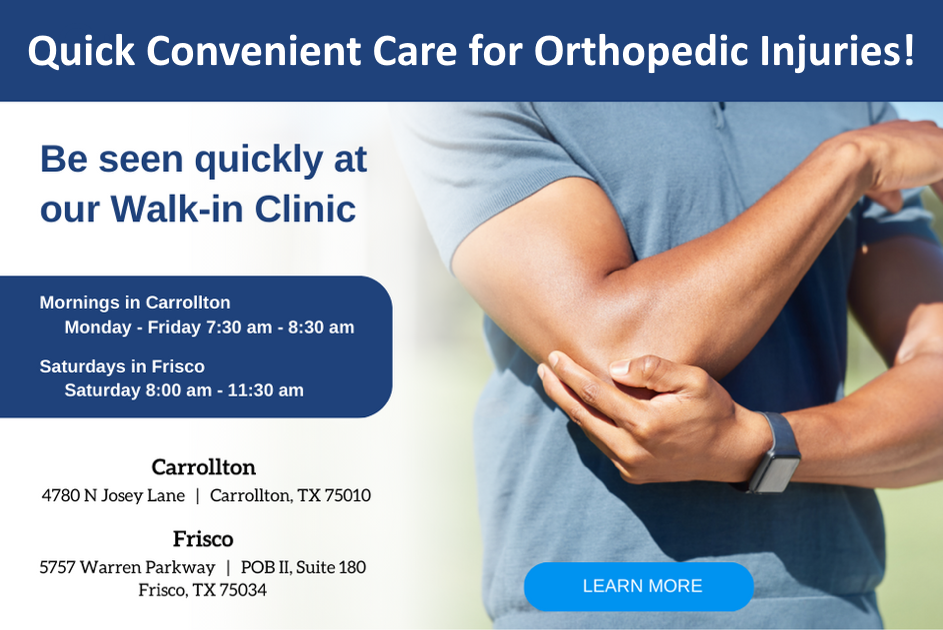When Shoulder Pain Strikes
Shoulder pain is a common problem in many individuals over the age of 40. Often, but not always, this is due to a rotator cuff tendon problem. The rotator cuff tendons are a group of four tendons that attach to the side of the shoulder that power the shoulder overhead. Common symptoms of rotator cuff pain include pain at the top of the shoulder that can radiate all the way down to the elbow. The pain can be exacerbated by raising the arm overhead, increased lifting activities and lifting objects out away from the body. Pain that worsens at night is also a common symptom.
Not all rotator cuff pain is due to a tear. In fact, it is a spectrum of disease from inflammation (bursitis) to partial tears to complete (full thickness) tears. A common misconception is that rotator cuff tears occur only after an injury. That is, in fact, not true. Most rotator cuff tears are due to wear-and-tear over time. As we age, so do our tendons. They begin to degenerate over the age of 40.
Treatment for rotator cuff problems depends on how severe this issue really is. Non-operative care is preferred whenever possible. This may include a physical therapy program, activity modification, anti-inflammatories, and steroid injections (if desired). Physical therapy exercises are key to long-term relief of rotator cuff-based pain. That is because physical therapy is designed to strengthen the rotator cuff muscles to allow the shoulder to function better, thereby decreasing pain. Without improving the muscle mechanics of the shoulder, non-operative care will often fail. Steroid injections can be an effective tool to mitigate the pain, especially at night. Many misconceptions about steroid injections exist. A single steroid injection used for rotator cuff-based pain is extremely safe and does not injure or weaken the tendon. Multiple injections are a different story and are only used in certain circumstances. The steroid injection can help reduce pain to allow you to participate more vigorously in the therapy program. Non-operative care of shoulder bursitis can be effective in over 80% of cases.
Rotator cuff tendon tears come in different varieties. A partial thickness rotator cuff tear means part of the tendon is detached from the bone. A full thickness rotator cuff tear means the tendon is completely detached from the bone. Oftentimes, we treat partial thickness rotator cuff tears non-operatively with the program outlined above. If non-operative treatment fails to provide sufficient pain relief, we commonly look at options for surgical treatment to repair the shoulder.
Full thickness rotator cuff tears are not usually able to be treated with exercise and strengthening. Usually, these complete tears require surgery for optimal outcome. Surgery is typically performed using small incisions and a camera. This is called Arthroscopic surgery and is performed on a same-day surgery (outpatient) basis. That means, you come to the surgery center and go home the same day. During the surgery, your surgeon will re-attach the tendon back to the bone from which it is torn. In addition, they may also perform other procedures to clean up the shoulder during the same surgery. That may include shaving away bone spurs (acromioplasty), cleaning up frayed tissue, and may even need to address the biceps tendon (which can be a source of pain down the road).
Shoulder surgery is painful and healing and recovering from rotator cuff surgery can take a long time. Patients generally need to use a sling for the first 5-6 weeks. They also need to participate in physical therapy. Therapy can be vigorous and ismindividualized for each patient. However, it is essential for optimal outcome. The good news is that rotator cuff surgery is approximately 90% effective for pain relief and improved function.
When to Get Help
If you have long-standing shoulder pain greater that 4-6 weeks, you may want to have this looked at by an orthopaedic shoulder specialist. If you have a fall or injury with an immediate onset of shoulder pain, you should have this looked at by an orthopaedic shoulder specialist. If ignored, rotator cuff tears can get worse over time causing significant shoulder problems and disability down the road.
Dr Fagelman is a board-certified orthopedic surgeon who specializes in shoulder and elbow conditions and Sports Medicine at OrthoTexas.


